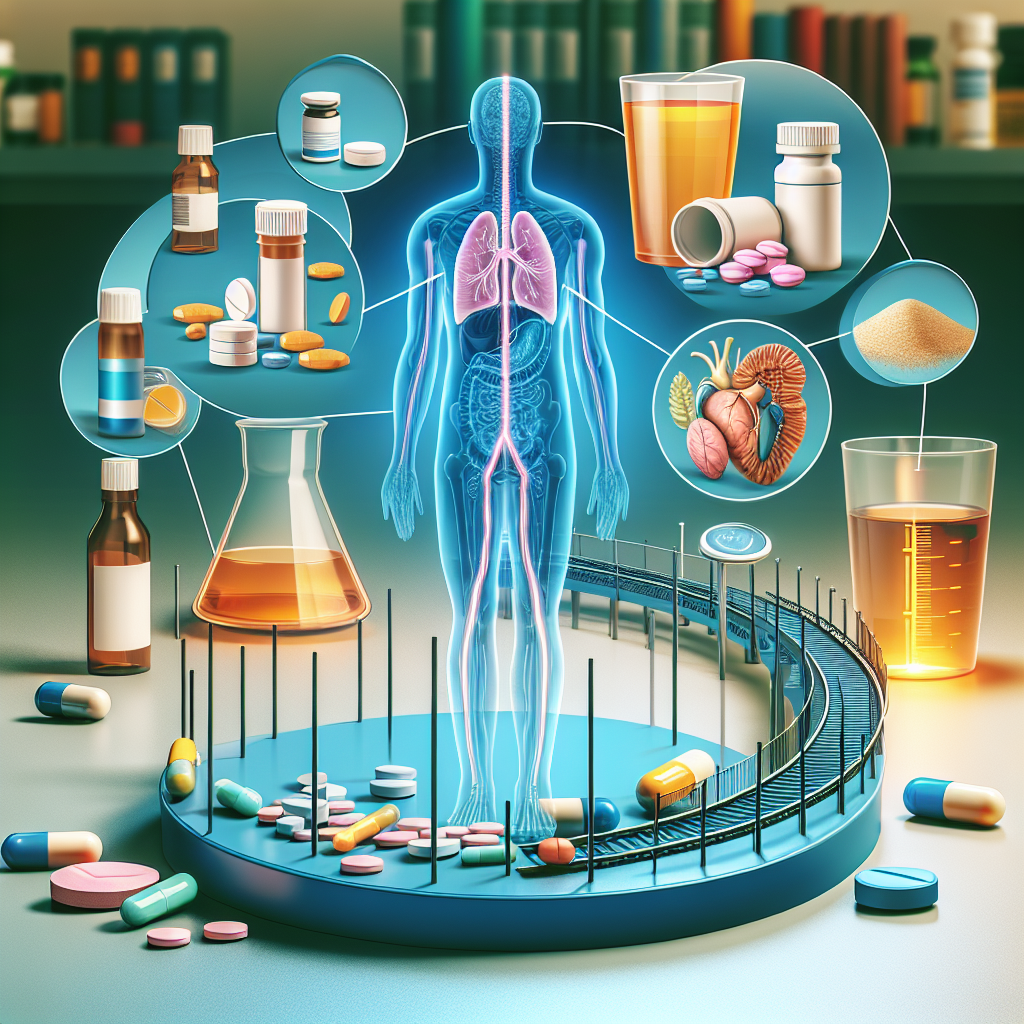-
Table of Contents

“Empowering Recovery: The Crucial Role of Medication in Alcoholism Treatment”
Introduction
The Role of Medication in Alcoholism Treatment
Alcoholism, a chronic and often debilitating disorder, affects millions of individuals worldwide, posing significant challenges to both personal health and societal well-being. While behavioral therapies and support groups have long been the cornerstone of alcoholism treatment, the integration of medication has emerged as a pivotal component in the comprehensive management of this condition. Medications can play a crucial role in reducing cravings, managing withdrawal symptoms, and preventing relapse, thereby enhancing the overall effectiveness of treatment programs. This introduction explores the various pharmacological options available, their mechanisms of action, and their impact on the recovery process, underscoring the importance of a multifaceted approach to treating alcoholism.
The Effectiveness of Medication-Assisted Treatment in Alcoholism Recovery
Medication-assisted treatment (MAT) has emerged as a pivotal component in the multifaceted approach to alcoholism recovery. This method combines the use of FDA-approved medications with counseling and behavioral therapies, offering a comprehensive strategy to address the complex nature of alcohol dependence. The effectiveness of MAT in alcoholism recovery cannot be overstated, as it provides a lifeline for individuals grappling with the physical and psychological challenges of addiction.
One of the primary medications used in MAT for alcoholism is naltrexone, which works by blocking the euphoric effects of alcohol, thereby reducing the incentive to drink. By diminishing the rewarding sensations associated with alcohol consumption, naltrexone helps individuals maintain sobriety and resist the urge to relapse. Another medication, acamprosate, is designed to stabilize the chemical balance in the brain that is disrupted by chronic alcohol use. This stabilization helps alleviate the emotional and physical discomfort that often accompanies early sobriety, making it easier for individuals to focus on their recovery journey.
Disulfiram, another medication used in MAT, operates differently by creating an acute sensitivity to alcohol. When someone taking disulfiram consumes alcohol, they experience highly unpleasant reactions such as nausea, vomiting, and headaches. This aversive conditioning serves as a powerful deterrent against drinking, reinforcing the commitment to abstinence. While these medications each have unique mechanisms of action, they share a common goal: to support individuals in overcoming the grip of alcoholism and reclaiming their lives.
The integration of medication with counseling and behavioral therapies is crucial for the success of MAT. Medications alone cannot address the underlying psychological and social factors that contribute to addiction. Therefore, combining pharmacological interventions with therapeutic support creates a holistic treatment plan that addresses both the physical dependence on alcohol and the emotional triggers that fuel it. Cognitive-behavioral therapy (CBT), for instance, helps individuals identify and change negative thought patterns and behaviors related to alcohol use. This dual approach not only enhances the effectiveness of the treatment but also empowers individuals with the tools and strategies needed for long-term recovery.
Moreover, the role of medication in alcoholism treatment extends beyond the individual to the broader community. By reducing the incidence of relapse and promoting sustained sobriety, MAT contributes to the overall well-being of families and communities affected by alcoholism. It alleviates the social and economic burdens associated with alcohol dependence, such as healthcare costs, lost productivity, and strained relationships. In this way, MAT serves as a beacon of hope, demonstrating that recovery is not only possible but also attainable with the right support and resources.
Inspiring stories of recovery abound, showcasing the transformative impact of medication-assisted treatment. Individuals who once felt trapped in the cycle of addiction have found renewed purpose and strength through MAT. Their journeys underscore the importance of a compassionate and evidence-based approach to alcoholism treatment, one that recognizes the value of medication as a vital component of recovery.
In conclusion, the effectiveness of medication-assisted treatment in alcoholism recovery is a testament to the progress made in understanding and addressing addiction. By combining medications with counseling and behavioral therapies, MAT offers a comprehensive and hopeful path to sobriety. It empowers individuals to overcome the challenges of alcoholism, rebuild their lives, and contribute positively to their communities. As we continue to advance in the field of addiction treatment, the role of medication will undoubtedly remain a cornerstone of successful recovery strategies.
Exploring Different Medications Used in Alcoholism Treatment and Their Benefits
In the journey toward recovery from alcoholism, medication can play a pivotal role in supporting individuals as they strive to reclaim their lives. While therapy and support groups are often the cornerstones of treatment, medications can provide an additional layer of support, helping to reduce cravings, manage withdrawal symptoms, and prevent relapse. Understanding the different medications available and their benefits can inspire hope and encourage those struggling with alcoholism to seek comprehensive treatment.
One of the most commonly prescribed medications for alcoholism is disulfiram, known by its brand name Antabuse. Disulfiram works by creating an acute sensitivity to alcohol. When someone taking disulfiram consumes alcohol, they experience unpleasant reactions such as nausea, vomiting, and headaches. This aversive conditioning helps deter individuals from drinking, reinforcing their commitment to sobriety. Although disulfiram does not cure alcoholism, it serves as a powerful deterrent, making it easier for individuals to resist the temptation to drink.
Another medication that has shown promise in treating alcoholism is naltrexone. Naltrexone works by blocking the euphoric and sedative effects of alcohol, reducing the rewarding sensations associated with drinking. This can significantly diminish cravings and help individuals maintain abstinence. Available in both oral and injectable forms, naltrexone offers flexibility in treatment plans, allowing healthcare providers to tailor the approach to each individual’s needs. The injectable form, known as Vivitrol, provides a long-acting option that can be particularly beneficial for those who struggle with medication adherence.
Acamprosate, marketed under the brand name Campral, is another medication used in the treatment of alcoholism. Acamprosate works by stabilizing the chemical balance in the brain that is disrupted by chronic alcohol consumption. By reducing the physical and emotional discomfort associated with prolonged abstinence, acamprosate helps individuals maintain their sobriety. This medication is particularly effective for those who have already achieved initial abstinence and are looking to sustain long-term recovery.
In addition to these well-known medications, there are other pharmacological options that can support alcoholism treatment. For instance, topiramate, an anticonvulsant medication, has shown potential in reducing alcohol consumption and promoting abstinence. Although not specifically approved for alcoholism treatment, topiramate’s ability to modulate neurotransmitter activity in the brain makes it a promising off-label option for some individuals.
While medications can be incredibly beneficial, it is important to recognize that they are most effective when used as part of a comprehensive treatment plan. Combining medication with behavioral therapies, counseling, and support groups can address the multifaceted nature of alcoholism, providing a holistic approach to recovery. This integrated strategy not only helps manage the physical aspects of addiction but also addresses the psychological and social factors that contribute to alcohol dependence.
Moreover, the decision to use medication should always be made in consultation with a healthcare provider. Each individual’s journey with alcoholism is unique, and a personalized treatment plan is essential for achieving the best outcomes. Healthcare providers can assess the specific needs and circumstances of each patient, ensuring that the chosen medication aligns with their overall treatment goals.
In conclusion, the role of medication in alcoholism treatment is both significant and inspiring. By offering additional tools to manage cravings, reduce withdrawal symptoms, and prevent relapse, medications can empower individuals to take control of their recovery journey. When combined with comprehensive support and therapy, these medications can help pave the way toward a healthier, sober life, instilling hope and resilience in those who seek to overcome alcoholism.
Q&A
1. **What medications are commonly used in the treatment of alcoholism?**
– Common medications used in the treatment of alcoholism include Naltrexone, Acamprosate, and Disulfiram. Naltrexone helps reduce cravings and the pleasurable effects of alcohol, Acamprosate helps maintain abstinence by stabilizing brain chemistry, and Disulfiram creates an adverse reaction to alcohol consumption.
2. **How does Naltrexone work in treating alcoholism?**
– Naltrexone works by blocking opioid receptors in the brain, which reduces the rewarding effects of alcohol and helps decrease cravings. This can help individuals reduce their alcohol consumption or maintain abstinence.
Conclusion
Medication plays a crucial role in the treatment of alcoholism by helping to reduce cravings, manage withdrawal symptoms, and prevent relapse. Medications such as disulfiram, naltrexone, and acamprosate have been shown to be effective when used in conjunction with behavioral therapies and support groups. These medications work by altering the brain’s chemistry to diminish the rewarding effects of alcohol, making it easier for individuals to maintain sobriety. However, the success of medication-assisted treatment often depends on the individual’s commitment to a comprehensive treatment plan that includes psychological support and lifestyle changes. Overall, while medication is not a standalone solution, it is a valuable component of a multifaceted approach to treating alcoholism.



